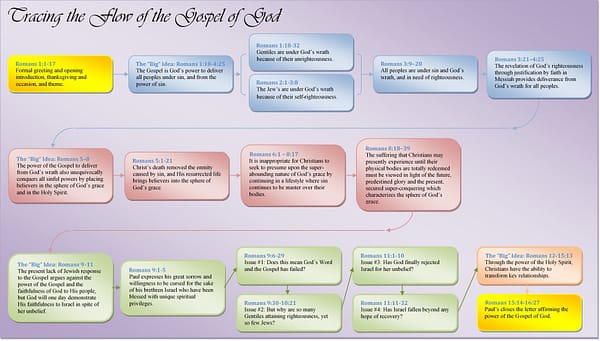Special Bonus
Here is a special bonus to help with your study of Romans. It is a "map" of the major themes of the book. Click the image below to enlarge and download:
There is a short introduction available for the book of Romans. You can read it here.
Key Themes (Romans)
The book of Romans, written by the Apostle Paul, is one of the most comprehensive and theologically profound books in the New Testament. It systematically outlines the Christian faith, addressing the nature of sin, salvation, grace, and the righteousness of God. Romans is foundational for understanding Christian doctrine and the relationship between the Law, faith, and grace. The key themes include:
- The Righteousness of God: A central theme in Romans is the righteousness of God, which refers to both His perfect moral character and the way He justifies sinners through faith in Jesus Christ. Paul explains that righteousness is not achieved by human effort or adherence to the Law, but is a gift from God, received through faith. This theme underscores that salvation is rooted in God’s righteousness and His gracious provision for humanity’s redemption.
- Justification by Faith: One of the most critical themes in Romans is justification by faith, which teaches that people are made righteous before God not by their works, but by faith in Jesus Christ. Paul argues that both Jews and Gentiles are guilty of sin and cannot be justified by the Law. Instead, through faith in Christ’s sacrificial death and resurrection, believers are declared righteous by God. This theme highlights the centrality of faith in the Christian life and the futility of relying on the Law or human effort for salvation.
- The Universality of Sin: Paul emphasizes that all people, both Jews and Gentiles, are sinners and fall short of God’s glory. Romans 3:23 states, "For all have sinned and fall short of the glory of God." This theme underscores the universal need for salvation and sets the stage for Paul’s explanation of the Gospel as the solution to humanity’s sin problem.
- The Power of the Gospel: Romans presents the Gospel as the power of God for salvation to everyone who believes. Paul emphasizes that the Gospel is not just good news, but a transformative power that brings salvation, forgiveness, and eternal life to all who have faith in Jesus Christ. This theme highlights the sufficiency of the Gospel to save, regardless of a person’s background or past.
- Life in the Spirit: Romans contrasts life in the flesh (living according to sinful human nature) with life in the Spirit (living under the influence of the Holy Spirit). Paul explains that those who are in Christ are no longer controlled by the sinful nature but are led by the Spirit, which brings life, peace, and empowerment to live righteously. This theme emphasizes the transformative work of the Holy Spirit in believers, enabling them to live in accordance with God’s will.
- The Role of the Law: Paul addresses the role of the Mosaic Law in God’s plan of salvation, explaining that while the Law is holy and reveals God’s standards, it cannot save. The Law serves to reveal sin and humanity’s inability to achieve righteousness on their own, pointing to the need for a Savior. This theme clarifies that the Law’s purpose is to lead people to Christ, who fulfills the Law and offers salvation through grace.
- God’s Sovereignty and Election: Romans discusses God’s sovereignty in the election and salvation of individuals and nations. Paul explains that God, in His sovereignty, chooses to extend mercy to some and hardens others, illustrating His authority over salvation. This theme raises questions about divine justice and human responsibility, but ultimately emphasizes that God’s ways are beyond human understanding and are rooted in His righteous and just nature.
- The Inclusion of the Gentiles: Paul addresses the inclusion of Gentiles in God’s plan of salvation, explaining that the Gospel is for all people, not just for the Jews. He argues that Gentiles are grafted into God’s covenant people through faith in Christ, and that this inclusion fulfills God’s promise to bless all nations through Abraham. This theme highlights the universality of the Gospel and God’s intention to bring salvation to the whole world.
- Christian Ethics and Living: In the latter part of Romans, Paul provides practical instructions on how believers should live in response to the Gospel. This includes teachings on love, humility, obedience to authorities, and living in harmony with others. This theme emphasizes that the Gospel not only transforms individuals spiritually but also has practical implications for daily life and relationships within the Christian community.
- The Future Hope: Romans speaks of the future hope that believers have in Christ, including the resurrection of the body, the renewal of creation, and the final redemption. Paul assures believers that their present sufferings are not worth comparing with the glory that will be revealed in them. This theme underscores the eschatological (end times) dimension of the Christian faith, pointing believers toward the ultimate fulfillment of God’s promises.
The book of Romans is a foundational text for Christian theology, offering a profound exploration of sin, grace, faith, and the righteousness of God. Through its themes of justification by faith, the role of the Law, life in the Spirit, and the inclusion of all people in God’s plan of salvation, Romans provides a comprehensive understanding of the Gospel and its transformative power. It calls believers to a life of faith, ethical living, and hope in the ultimate fulfillment of God’s promises.
What I Noticed Today (Romans 1-3)
Romans 1
















In verses 1-7, Paul identifies himself as a slave of Jesus Christ, an apostle singled out to present the Good News.
Note: Some translations read “servant of Jesus Christ.” A better translation of the Greek word doulos is “slave.” A slave is owned, bought for a price, receives no wages, and cannot quit. A servant is a free person who can quit and receives wages.
Note: Paul follows the traditional letter opening formula in Romans: 1) naming the author (v. 1), naming the recipient (v. 7a), and 3) a salutation (v. 7b). This formula is used in each of the New Testament letters except Hebrews and 1 John.
Note: Verse 7 some translations read “and called to be saints.” This does not mean we are “to be” saints. A better reading is “called as saints” in that as Christians, we are saints based on the sovereign call of God.
In verses 8-15, Paul begins the letter with a prayer of thanksgiving for the faith of the believers in Rome and how it had spread over all the world (meaning the Roman empire). Paul had planned on many occasions to come to Rome but had been prevented. Now, however, he wanted his ministry to accomplish three things:
- to impart some spiritual gift to them (v. 11),
- to give and receive encouragement (v. 12), and
- to have a fruitful time of ministry with them (v. 13).
Paul said he felt obligated to preach the Gospel to both the Greeks and the barbarians, and the wise and the foolish.
Note: The word translated “non-Greeks” (v. 14) in some translations literally means “barbarians.” Paul’s point is he must take the Gospel to those who speak Greek as well as those who do not.
In verses 16-17, Paul presents the theme of the letter to the Romans. The Gospel of God is to everyone who believes (Jews and Gentiles) in God’s power of salvation. God’s righteousness is revealed and comes to us based on our response to Him in faith (quoting Habakkuk 2:4).
Romans 1:18-3:20
Paul sets out the universal need of mankind for God’s righteousness. First, based on the guilt of the Gentile world (Romans 1:18-32). And second, based on the guilt of the Jews (Romans 2:1-3:20).
In verses 18-25, God’s wrath is being revealed against the godless and unrighteous who suppress the truth.
Note: The phrase “is revealed” (v. 18) should not be read as past tense. It is present tense with continuing action, which means “God’s wrath is being revealed.”
Since creation, man engaged in sin, exchanging the glory of God for images (idols). They exchanged truth for a lie. They worshiped a creation rather than the Creator.
In verses 26-32, because of this, God allowed them their sinful passions. Because they did not think it important to glorify God, He allowed them to engage in all kinds of immoral behavior: unrighteousness, evil, greed, and wickedness. They are full of envy, murder, quarrels, deceit, malice, gossips, slanderers, God-haters, arrogant, proud, boastful, inventors of evil, disobedient to parents, undiscerning, untrustworthy, unloving, and unmerciful. They continue to do these things in the full knowledge that they deserve death, and by encouraging others to behave the same way they receive God’s condemnation.
Romans 2












God judges based on three divine standards: truth (vv. 2-4), impartiality (vv. 5-11), and Jesus Christ (vv. 12-16).
In verses 1-4, Paul says every one of you when you judge another, also condemn yourselves. The point being everyone has sinned, so no matter how moral or righteous you think you are, you stand condemned before God because you do some of the same things.
In verses 5-11, because of their hardness and unrepentant hearts, they were storing up God’s wrath for the day of judgment. He will repay everyone according to their works: eternal life to those who are righteous and judgment for those who are unrighteous. The judgment of God applies to both Jews and Gentiles; there is no favoritism with God.
Note: In verse 6, the phrase “according to their works” should not be taken as works righteousness or salvation by works. Christians receive salvation by faith alone. Rather, works are seen as a reflection of one’s heart toward God.
In verses 12-16, Paul demonstrates God’s impartiality in judgment will account for a person’s knowledge of God. The Law of Moses did not save people. Rather, it served to show how Jews had fallen short of God’s standard of righteousness. Those that did not have the Law of Moses (Gentiles), but did good, showed they had the Law written on their hearts, as confirmed by their consciences.
Note: The emphasis of this section is on God’s impartiality in the judgment of both Jews and Gentiles. All have fallen short of God’s standards of righteousness, and all will face judgment. God knows every secret in a person’s life, and Jesus Christ will be the final judge (Acts 17:31).
In verses 17-24, Paul addresses Jews specifically and their belief in their moral superiority over Gentiles. He listed eight ways in which Jews thought themselves superior to Gentiles:
- they rely on the law and think themselves special because of it,
- they boast about their relationship with God,
- they say they know God’s will,
- they judge what they say is best,
- they are instructed by the law,
- they thought of themselves as superior to Gentiles – they were to be their guides, a light, instructors of the foolish, and teachers of infants,
- they thought they had the knowledge and truth, and
- they thought they had the right to teach others even though they were guilty of breaking the Law themselves.
They ended up dishonoring God by breaking the Law causing the name of God to be blasphemed among the Gentiles.
Note: Paul’s aim is for Jews to recognize their hypocrisy. Why would Gentiles honor God when His own chosen people did not follow Him?
In verses 25-29, Jews trusted not only in the Law of Moses but also in their traditions and rites. Paul continues saying circumcision (a sign of the covenant between God and Israel, Exodus 12:44-49) benefits only if you observe all of the law, but if you violate any of the Law your circumcision has become uncircumcision. When you violate the law, it’s as if you had never been circumcised. On the other hand, if an uncircumcised man keeps the law, his uncircumcision will be counted as circumcision.
True circumcision, says Paul, is not a matter of the flesh but of the heart by the Spirit of God.
Note: Paul again points out the impartiality of God in judging man according to His righteous standard. The outward sign of circumcision in compliance with the letter of the law means nothing if the heart has not been circumcised by the Spirit of God.
Romans 3















In verses 1-4, Paul asks what advantage does a Jew have or what benefit is there to circumcision.
Note: Paul says there are many “advantages” in every way. Then he says “first,” implying there will be a list of things, but he addresses only this one thing; they have been entrusted with the Word of God.
Paul says even if some Jews did not believe God would still be faithful to his promises; their lack of faith does not negate God’s faithfulness.
In verses 5-8, Paul addresses the issue of righteousness and truth. Some Jews would say their unrighteousness highlights God’s righteousness, and therefore God would be unrighteous in judging the sinful Jews. By extension, if God could not fairly judge the Jews, He certainly could not fairly judge the world.
Following the same logic, some Jews would say their lack of truth enhances God’s truth. How, then can God condemn him as a sinner? By extension, such people would say let us sin all the more, so that good will come out of it.
Paul concludes saying people who make these kinds of arguments are themselves condemned.
In verses 9-20, Paul concludes saying the whole world is guilty before God.
Paul asks, are we Jews better than the Gentiles? And he answers no, we are all guilty; we have all sinned. To make his point, Paul quotes six Old Testament passages:
- Psalm 14:1-3. We are not righteous. They do not understand or seek God.
- Psalm 5:9 (v. 13a). They are full of lies and deceit.
- Psalm 140:3 (v. 13b). Their lips are full of poison.
- Psalm 10:7 (v. 14). They are full of cursing and bitterness.
- Isaiah 59:7-8 (vv. 15-17). They shed innocent blood and do not know peace.
- Psalm 36:1 (v. 18). They have no fear of God.
Note: Paul’s description of the wickedness of man involves our throats, lips, and mouths, our feet, and our eyes. Our wickedness is seen in our speech, in what we do, in how we behave with others, in our dishonesty, and in our bitterness towards others. All this culminates in no fear of God.
All are subject to God’s judgment. No one will be justified by works of the Law because the Law only serves to bring knowledge of sin.
Romans 3:21-5:21
In verses, 3:21-5:21, Paul reveals the only person who met God’s perfect standard of righteousness is His Son, Jesus Christ. We are justified through God’s imputation of Christ’s righteousness upon us, and that, by faith in Christ alone.
In verses 21-26, Paul provides a complete description of God’s righteousness coming to man through faith in Christ:
- Righteousness comes from God through faith in Jesus Christ (v. 22).
- All have sinned and fallen short of the glory of God (v. 23).
- We are justified by God’s grace because we were redeemed by Jesus (v. 24).
- God presented Jesus as a propitiation (atoning sacrifice) through faith in His blood (v. 25a).
- God’s righteousness is seen in His justice. He passed over previous sins in order to declare righteous those who profess faith in Jesus (vv. 25b-26).
Note: In Greek, this entire section (vv. 21-26) is one long sentence. Paul’s beginning “But now” marks a dramatic shift from the previous section.
In verses 27-31, Paul anticipated four questions and provided answers:
- Where then is boasting? It is excluded (v. 27a). Jews have no special position to boast from.
- By what kind of law? By one of works? No by a law of faith (v. 27b). Because man is justified by faith (v. 28).
- Is God a God of the Jews only? Is He not also for Gentiles? Yes, for there is one God for Jews and Gentiles who will justify the circumcised and uncircumcised by faith (vv. 29-30).
- Is the Law nullified by faith? Absolutely not, we uphold the Law through faith (v. 31).
Some thoughts for further consideration:
- The Gospel of God is the power of God alone to salvation by the grace of God. We have all sinned; we have all fallen short of the glory of God.
- We are justified (declared righteous) because of Jesus’ death on the cross.
- Jesus’ shed blood was a propitiation (an atoning sacrifice) for our sin.
- It is only through faith in Jesus and His finished work on the cross that we may be made righteous before God.
What did you notice in your study today? Feel free to visit the website and leave a question or a comment.


